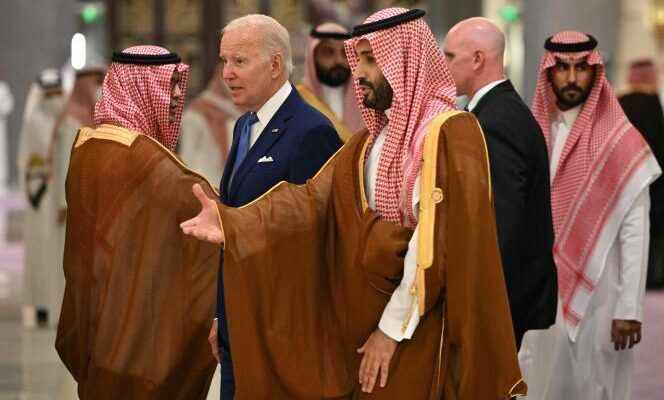“If you want to get something in the Middle East, you can’t ignore Saudi Arabia. » The formula, taken up like a mantra by editorial writers and commentators in the Saudi kingdom for years, took on particular prominence at the end of the twenty-four-hour visit carried out by Joe Biden, Friday July 15 and Saturday July 16.
The American president left after a summit in Jeddah during which he assured nine heads of state of the region – the six members of the Gulf Cooperation Council (Saudi Arabia, United Arab Emirates, Qatar, Oman, Kuwait, Bahrain) , as well as Egypt, Jordan and Iraq – that his country “would not turn away” from the Middle East, leaving “a vacuum that could be filled by China, Russia or Iran”.
The Gulf States remain skeptical about the long-term commitments of the United States, which they no longer consider as a reliable bulwark against their Iranian rival. The Biden administration has in fact focused most of its foreign policy energy on dealing with China, and then Russia since the start of the war in Ukraine.
Washington has since sought to compensate for its disengagement with an “Israeli umbrella” which would see the Jewish state put its military and technological power at the disposal of states ready to ally with it and join an emerging regional defense alliance against Tehran.
No recognition of Israel by Saudi Arabia
The result seems mixed at the end of this visit. Riyadh has decided to stick to informal relations with Tel Aviv for the time being when the United Arab Emirates uses a much more cautious rhetoric than its new Israeli ally vis-à-vis Iran.
The face-to-face between the American president and the crown prince of Saudi Arabia, Mohammed Ben Salman, known as “MBS”, was particularly awaited. While he had promised to treat the Saudi crown prince as “outcast” after the assassination of Saudi journalist and dissident Jamal Khashoggi in 2018, the American head of state had to renounce himself.
Upon his arrival at the White House, Joe Biden, who said he was determined to break with the complacency towards autocrats practiced by Donald Trump, did not however hide his enmity towards “MBS”who was designated by the CIA as the order giver of the journalist’s assassins inside the Saudi Arabian consulate in Istanbul.
The American president had even refused to meet, and even speak, with the de facto leader of Saudi Arabia. This resolution expired on Friday. While the two men discussed the matter, according to officials from both countries, the conversation resulted in noticeably different accounts from the U.S. and Saudi sides.
You have 42.49% of this article left to read. The following is for subscribers only.
